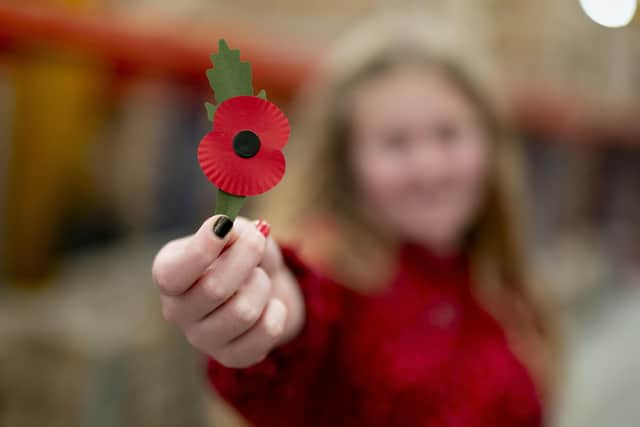The Royal British Legion is right to move with the times with plastic-free poppies - Jayne Dowle
For an organisation too often accused of only looking backwards, this is a significant move forwards.
The new poppy design, launched last week after three years in planning and development, is made entirely from paper, to support the plastic-free movement. The grey plastic stem and a black plastic stigma surrounding a circle of red is now entirely paper, with half made up from the offcuts of coffee cup production.
Advertisement
Hide AdAdvertisement
Hide AdThere will be those who chunter, no doubt, that this is breaking with tradition, although these days many people sport an enamel pin poppy, a bejewelled bright red brooch, or even a crocheted bloom.


The Royal British Legion, formed in 1921, when several separate charities came together to support ex-servicemen who had suffered in the First World War, is well aware that it has to stay relevant.
There have been well-publicised shortages of Poppy Day sellers in recent years, particularly since the pandemic. I read the other day that in one town, part of the borough of Barnsley, there will be no seller on the street this year because no-one can be found to volunteer.
In Burton-on-Trent, Staffordshire last year, the Poppy Appeal was actually cancelled due to a “terrible shortage” of volunteers according to Mark Smith, the local community fund-raiser.
Advertisement
Hide AdAdvertisement
Hide AdHowever, as we witness terrible conflict in Israel and Gaza, and remember that Ukraine is still under attack from Russia, this year’s Poppy Appeal should remind us how we must never take our freedom for granted. Those who have given their lives so that others may not live in fear - from the mud of Passchendaele to the plains of Afghanistan – deserve our respect. Tossing a pound into a collecting tin doesn’t even begin to repay the debt.
Still, there are those who also chunter that in these mindful times, the entire poppy appeal is irrelevant, even contentious, and should be scrapped.
I read an account the other day arguing that as the last veterans of the Second World War are now in their nineties, it bears little connection to modern life, and can even be a negative force, causing bitterness and division in our multicultural society.
It is right that we debate the relevance of this annual period of Remembrance. But, although it may bring up uncomfortable truths, not least the terrible treatment of Commonwealth soldiers, sailors and airmen who fought for their King then found themselves on the scrapheap after the Second World War, it doesn’t mean it has to be ‘cancelled’ altogether.
Advertisement
Hide AdAdvertisement
Hide AdHijacked by point-scoring politicians perhaps – you might recall Prime Minister Rishi Sunak surprising commuters at Westminster Tube station in London last November when he turned up with a tray-full during the morning rush hour – the cause is still front and centre when it comes to supporting UK veterans of all conflicts.
With 180,000 members involved in fundraising, volunteering and activities, this is not just a charity for old men, although it does offer six care homes around the country and a dedicated team of dementia nurses who look after male and female veterans. The Royal British Legion also supports former armed forces personnel who find themselves fallen on hard times, unemployed or homeless, and runs the National Memorial Arboretum, at Alrewas, near Lichfield, Staffordshire. This place of remembrance to honour the fallen and recognise service and sacrifice, hosts families, school groups and visitors from overseas, and it’s probably fair to say that there is nowhere else quite like it in the world.
So, as the charity itself moves with the times, so must we. Those who proclaim that ‘poppies’ are an outdated symbol of militaristic pride, as I did once as an idealistic A Level history student shocked by the war poetry of Wilfred Owen and Siegfried Sassoon, should wise up.
My grandfather, born in 1901, soon put me right when I insisted, at 17, that I was only going to wear a white poppy, the sign of pacifism. I was making a protest, I think, that the wearing of a red poppy somehow celebrated militaristic pride and the honour of sacrifice. Ordinary working people, lions led by donkeys, cannon fodder, and so on.
I wasn’t having any of that, I said. But my grandad, who was down the pit through both world wars, talked quietly of his friends who had gone off to fight and had never come home.
